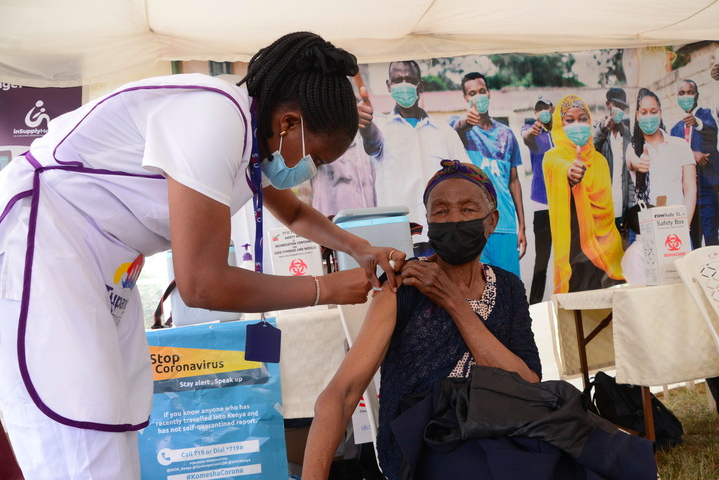Health CS Aden Duale is representing Kenya at the meeting in Geneva.
Members of of
the World Health Organization (WHO), including Kenya, on Tuesday adopted by
consensus the world’s first Pandemic Agreement.
The
landmark decision culminates more than three years of intensive negotiations
launched by governments in response to the devastating impacts of the Covid-19
pandemic.
This is the
world’s the second only health treaty after the WHO Framework Convention on
Tobacco Control, which was adopted in 2003 and entered into force in 2005.
The new WHO
Pandemic Agreement was proposed by among others, President Uhuru Kenyatta in
May 2021, following the hoarding of vaccines and diagnostics by rich countries.
Governments
adopted the WHO Pandemic Agreement on Tuesday in a plenary session of the World
Health Assembly, WHO’s peak decision-making body. The adoption followed Monday
approval of the Agreement by vote (124 in favour, 0 objections, 11 abstentions)
in Committee by Member State delegations.
“The
Agreement is a victory for public health, science and multilateral action. It
will ensure we, collectively, can better protect the world from future pandemic
threats. It is also a recognition by the international community that our
citizens, societies and economies must not be left vulnerable to again suffer
losses like those endured during Covid-19,” said Dr Tedros Adhanom Ghebreyesus,
WHO Director-General.
Governments
adopted the WHO Pandemic Agreement on Tuesday in a plenary session of the World
Health Assembly, WHO’s peak decision-making body.
Kenya’s
Health Cabinet Secretary Aden Duale was present.
“Starting
during the height of the Covid-19 pandemic, governments from all corners of the
world acted with great purpose, dedication and urgency, and in doing so
exercising their national sovereignty, to negotiate the historic WHO Pandemic
Agreement that has been adopted today,” said Dr Teodoro Herbosa, Secretary of
the Philippines Department of Health, and President of this year’s World Health
Assembly, who presided over the Agreement’s adoption.
“Now that
the Agreement has been brought to life, we must all act with the same urgency
to implement its critical elements, including systems to ensure equitable
access to life-saving pandemic-related health products. As Covid was a
once-in-a-lifetime emergency, the WHO Pandemic Agreement offers a
once-in-a-lifetime opportunity to build on lessons learned from that crisis and
ensure people worldwide are better protected if a future pandemic emerges.”
The WHO
Pandemic Agreement sets out the principles, approaches and tools for better
international coordination across a range of areas, in order to strengthen the
global health architecture for pandemic prevention, preparedness and response.
This includes through the equitable and timely access to vaccines, therapeutics
and diagnostics.
Regarding
national sovereignty, the Agreement states that: “Nothing in the WHO Pandemic
Agreement shall be interpreted as providing the Secretariat of the World Health
Organization, including the Director-General of the World Health Organization,
any authority to direct, order, alter or otherwise prescribe the national
and/or domestic law, as appropriate, or policies of any Party, or to mandate or
otherwise impose any requirements that Parties take specific actions, such as
ban or accept travellers, impose vaccination mandates or therapeutic or
diagnostic measures or implement lockdowns.”
The resolution on the WHO Pandemic Agreement adopted by the
World Health Assembly sets out steps to prepare for the accord’s
implementation. It includes launching a process to draft and negotiate a
Pathogen Access and Benefit Sharing system (PABS) through an Intergovernmental
Working Group (IGWG). The result of this process will be considered at next
year’s World Health Assembly.
Once the Assembly adopts the PABS annex, the WHO Pandemic
Agreement will then be open for signature and consideration of ratification,
including by national legislative bodies. After 60 ratifications, the Agreement
will enter into force.
In addition, Member States also directed the IGWG to
initiate steps to enable setting up of the Coordinating Financial Mechanism for
pandemic prevention, preparedness and response, and the Global Supply Chain and
Logistics Network (GSCL) to “enhance, facilitate, and work to remove barriers
and ensure equitable, timely, rapid, safe, and affordable access to
pandemic-related health products for countries in need during public health
emergencies of international concern, including pandemic emergencies, and for
prevention of such emergencies.”
According to the Agreement, pharmaceutical manufacturers
participating in the PABS system will play a key role in equitable and timely
access to pandemic-related health products by making available to WHO “rapid
access targeting 20 per cent
of their real time production of safe, quality and effective vaccines,
therapeutics, and diagnostics for the pathogen causing the pandemic
emergency.” The distribution of these
products to countries will be carried out on the basis of public health risk
and need, with particular attention to the needs of developing countries.


